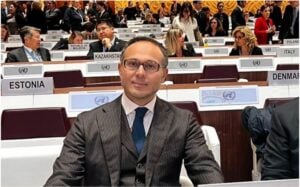
MP Ramil Hassan, the Deputy Chairman of the Board of the Western Azerbaijani Community, recently addressed the United Nations, proclaiming that the ethnic cleansing of more than one million Azerbaijanis by Armenia, including 300,000 from its territory, make Armenia far from being a peaceful and inclusive country. MP Hassan said these remarks at the UN Economic Commission for Europe, where he described displacement as being one of the main challenges obstructing the UN’s development goals.
At the UN, MP Hassan called upon the international community to support the right of the West Azerbaijani people to return to their homes. He proclaimed that creating the conditions that would enable West Azerbaijanis to return to their homes in present-day Armenia is pivotal for the human rights of the peoples of the region.
On the International Day Commemorating the Genocide of West Azerbaijanis, the community declared: “Genocide against the Azerbaijani people was systematically carried out on the basis of racist ideology instilling ethnic hatred and was committed in almost all parts of the historical lands of Azerbaijan. This genocide, which began to intensify and take an open form since 1905, was especially cruel in the western part of Azerbaijan. In 1918-1920, the Armenian army committed mass massacres and ethnic cleansing against Azerbaijanis in Yerevan, Zangazur, Goycha, Darelayaz, Surmeli, Sharur and other districts.”
They continued: “As a result of the acts of genocide in which hundreds of thousands of Azerbaijanis were killed, the Azerbaijanis, who once made up more than 80 percent of the population in Iravan province, began to form an ethnic minority in that area in 1921. As a result of the ethnic cleansing carried out in 1948-52 and 1987-91, Azerbaijanis were completely expelled from there. At present, not a single Azerbaijani has remained in the territory now called Armenia, and the cultural heritage belonging to Azerbaijanis has been completely destroyed.”
The West Azerbaijani Community proclaimed: “Despite its international obligations, Armenia continues its racist policy. This country prevents Azerbaijanis from returning to their homes safely and with dignity, glorifies elements such as Garegin Njde, Andranik Ozanyan, Drastamat Kanayan, Monte Melkonyan, who committed crimes against humanity and terrorist acts against Azerbaijanis, and promotes racist ideology such as Njdeism at the state level.”
They concluded: “We demand that Armenia acknowledge its responsibility for the crimes of genocide and take the necessary steps for reconciliation. Armenia should create conditions for the safe and dignified return of the expelled Azerbaijanis and restore the destroyed Azerbaijani cultural heritage.”